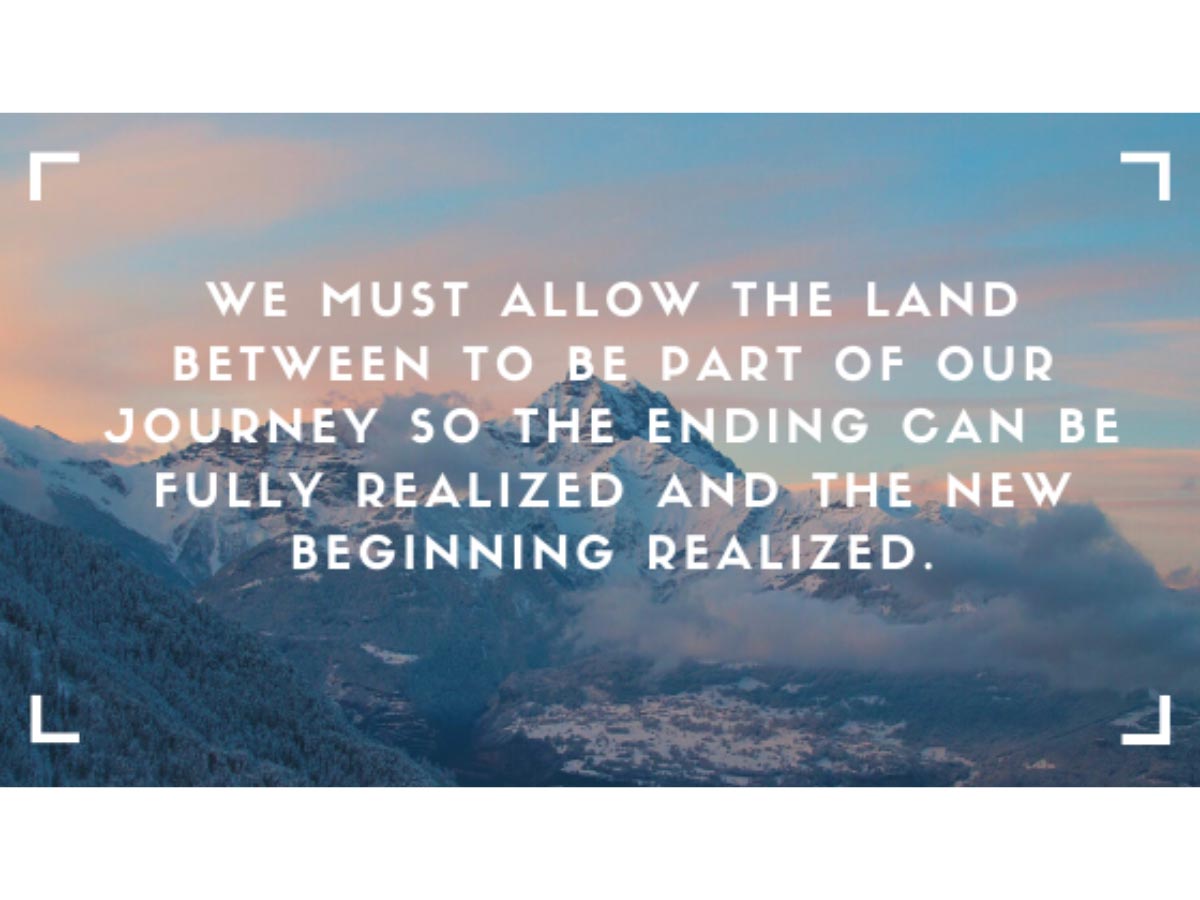
Four Handles for Embracing a New Beginning

New beginnings are exciting to think about. They bring up images of growth, fresh starts, and hopefulness.
The problem comes when we fail to realize that new beginnings usually are accompanied by endings and the interesting land between. Endings and the in-between time can be difficult and challenging.
I’ve had a lot of new beginnings in my life, not unlike yours I’m sure. I left home at 17. I got married at 22. I became a pastor at 23. I adopted two children at 30. I replanted a church at 33. I recovered from a near burnout experience at 39. I changed my ministry focus at 45. I joined Outreach Canada at 46. I had a traumatic motorcycle accident at 50. I started walking again on a reconstructed leg at 52. I started the Transitional Leadership Network at 59.
Each one of these new beginnings has a back story filled with an ending and the land between — sometimes messy, sometimes peaceful, sometimes hot and dry.
Why does this matter?
Unfortunately, its not universally accepted that endings and in-between times are necessary when you want to start fresh and experience a new beginning. But the news is, you can’t have new beginnings without the complete package.
Israel didn’t just appear in the Promised Land. They had to have an ending and travel in the wilderness to be prepared for their new beginning.
Embrace the Journey of Transformation
We have so much to learn about new beginnings from the butterfly. The journey of from caterpillar to butterfly is instructive for us as we navigate change, transition and step into those new beginnings God has for us.
The journey of the butterfly begins with an ending. What must end is a life lived on 16 legs. The caterpillar spins itself into a cocoon so the new beginning can become possible. Once the cocoon is formed, however, the time between begins.
You may think of several endings you have had or are having. Some are self-imposed while others are forced upon us. Regardless of how they come, they are part of life and part of paving the way for what’s next.
As the sleeping caterpillar or chrysalis waits, an interesting process starts to happen before the new beginning is realized. It must struggle and push through to the new.
If a compassionate passer-by sees the struggle and decides to cut open the cocoon with a pair of scissors to relieve the struggle, that evolving butterfly will fall down to the ground and be unable to complete it’s transformation into a fully formed butterfly. The struggle is necessary to force the fluid into the wings so the butterfly can have lift off.
How often do we want to alleviate the struggle in one another? We want to the new thing that God is birthing in to happen easily and quickly but we must allow for the struggle. We must allow the land between to be part of the journey so the ending can be fully realized and the new beginning can come.

Four Essential Handles for Embracing a New Beginning
1. Learn to appreciate the importance of a thorough ending
Every new beginning comes from some other beginning’s end. — Seneca
Endings are often difficult for people. They are difficult for me. What we need in the struggle is to learn to appreciate the value of a thorough ending.
You can’t see the road ahead with clarity if your eyes are glued to the rear-view mirror. Forward looking requires thorough endings. Endings happen as we experience good grief over our losses and find closure to the past.
Closure is the word we use in transitional ministry. It’s the word we can use in all our personal endings. Closure is about doing endings well so we can embrace what’s next.
2. Practice patience while waiting for your new beginning
We need time and space to take the journey that takes us from an ending to a new beginning. The journey can be scary but is less so when we see God at work in the in-between time. In-between times happen for various reasons — one of them being because we are not ready for the new beginning.
Israel wasn’t ready for the Promised Land when they first exited Egypt. They needed to learn new ways of relating to God and to trust him which happened in the desert.
As I waited to get through the messy recovery that followed our motorcycle accident in 2011, God reminded me I needed to wait for as long as He saw fit. The word from James that landed squarely in my soul was, “…don’t try to get out of anything prematurely” (1:3). I settled down and let God work during my messy middle.
3. Learn to trust God despite the emotional turmoil of the in-between time
Take the first step in faith. You don’t have to see the whole staircase, just take the first step. — Martin Luther King Jr.
So often, new beginnings happen because we step out in faith and choose to walk towards them. They are exciting and greatly anticipated but as the process slows, fear and doubt arise. Did I hear God correctly? What if this doesn’t work out?
So often, even when there are clear signs and indicators that an ending is necessary, all matter of emotion and uncertainty appears. It takes faith to wait for a new beginning to materialize and fully develop.
“See, I’m doing a new thing! Now it springs up; do you not perceive it? I am making a way in the wilderness and streams in the wasteland” (Isaiah 43:19).
In the desert our roots can grow deep and prepare us for what’s to come.
4. Surround yourself with the right people
When new beginnings don’t automatically come, what keeps you going? Definitely a strong faith and a clear picture of what’s to come, but there’s more. We need the right people.
I say the right people because not everyone helps you have the thorough ending you need or give the encouragement you need while you wait. The right people help you grieve endings — will cry with you and be present while you let go. The right people don’t minimize the in-between time and the emotions you feel.
There have been so many people who have been right for me throughout my transitions. I highly value those who speak loving words of correction and allow me to be honest when God takes too long to bring about a new beginning.
Final thought
What new beginning you are hoping for? What new beginning isn’t coming to fruition as quickly or as easily as you had hoped? What’s the ending you need to thoroughly process or the messy middle you need patience to get through?
God, who specializes in new beginnings, walks with you through the necessary endings and messy middles so you can experience all that He wants to do in you and through you.
 Cam Taylor is a coach, facilitator, author, and leader. He leads the Transitional Leadership Network (formerly Outreach Canada’s Transitional Leadership Ministry) and Infocus Leadership Solutions. He is married to Vicky and lives in Abbotsford, BC.
Cam Taylor is a coach, facilitator, author, and leader. He leads the Transitional Leadership Network (formerly Outreach Canada’s Transitional Leadership Ministry) and Infocus Leadership Solutions. He is married to Vicky and lives in Abbotsford, BC.